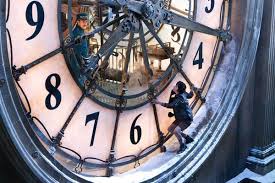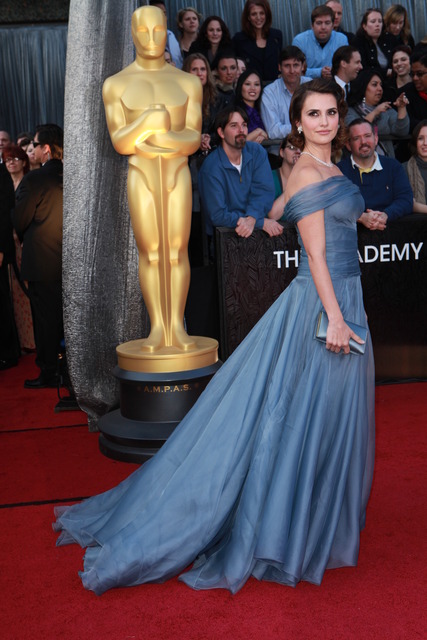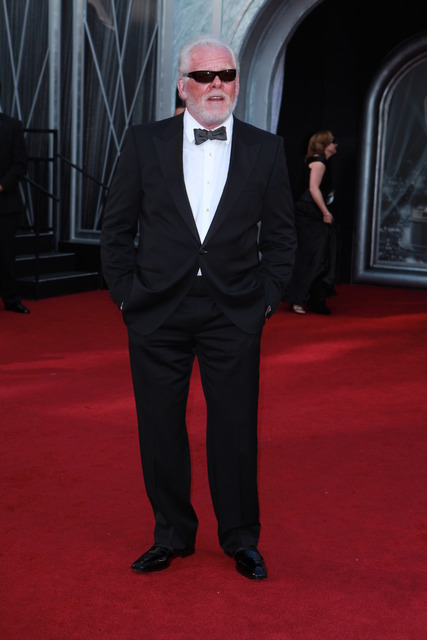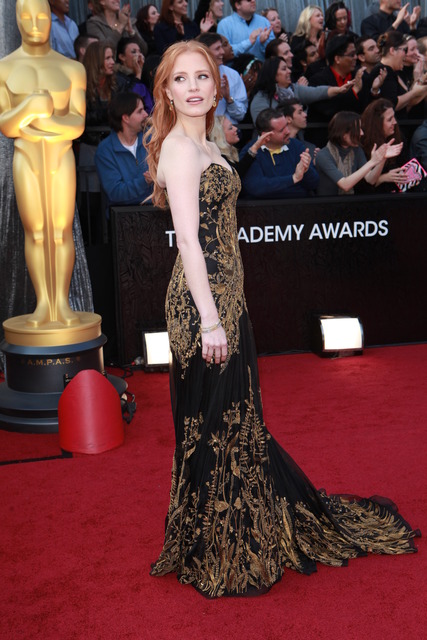Over with another edition of the Academy Awards in a year I was extremely happy with many of the films, therefore leaving room in my conscience to accept many variations of the the final poles. Mainly predictable, I was only shocked right off the overture when Richardson took over Lubetzki, because despite having done a wonderful job in Hugo, this was the goal of honor Tree of Life deserved so bad. As you can see by my picks, I didn't for a minute believed Meryl would ravish her third statuette but I joyfully applauded. Angus Wall and Kirk Baxter won their second consecutive Oscar (Best Editing), after The Social Network.
My red carpet highlights would be the powerful Brad and Angie, dazzling Jessica Chastain, enthralling Penélope Cruz, gorgeous Emma Stone, sparkling Mila Jovovich, plus Nick Nolte, George Clooney, Jean Dujardin and the irreverent The Dictator (scroll to bottom to watch the video).
A much more sober ceremony that last year's, host by an inspired and witty Billy Crystal, dedicated in its numbers and performances as much as in its awards to the history and the past of the seventh art. We all giggled at imagining how would Dujardin deal with the necessity of a speech in case of win and I must underline it was my favorite speech of the night. The best introduction, Ben Stiller and Emma Stone.
The Artist and Hugo took home 5 golden men, followed by The Iron Lady with 2.
WHITE UNDERLINED: Got it right.
BLUE UNDERLINED: Didn't get it.
Score without alternatives: 16 out of 21 (76%)
Score with alternatives: 18 out of 21 (85%)
Woody didn't show up, The Dictator did.
BEST FILM
The Artist
Alternative: Hugo
Second alternative: The Descendants
The Artist
Alternative: Hugo
Second alternative: The Descendants
BEST DIRECTOR
Michel Hazanavicius (The Artist)
Alternative: Martin Scorsese (Hugo)
BEST ORIGINAL SCREENPLAY
Midnight in Paris (Woody Allen)
Alternative: A Separation (Asghar Farhadi)
BEST ADAPTED SCREENPLAY
The Descendants (Alexander Payne, Nat Faxon and Jim Rash)
Alternative: Moneyball (Steve Zaillian, Aaron Sorkin and Stan Chervin)
BEST ACTOR IN A LEADING ROLE
Jean Dujardin (The Artist)
Alternative: George Clooney (The Descendants)
BEST ACTRESS IN A LEADING ROLE
Mery Streep (The Iron Lady)
Alternative:
BEST SUPPORTING ACTOR
Christopher Plummer (Beginners)
Alternative: Kenneth Branagh (My Week with Marilyn)
BEST SUPPORTING ACTRESS
Octavia Spencer (The Help)
Alternative: Jessica Chastain (The Help)
BEST ANIMATED FILM
BEST SUPPORTING ACTRESS
Octavia Spencer (The Help)
Alternative: Jessica Chastain (The Help)
BEST ANIMATED FILM
Rango
Alternative: Puss in Boots
BEST FOREIGN FILM
A Separation (Iran)
Alternative: Footnote (Israel)
BEST DOCUMENTARY
Paradise Lost 3: Purgatory
Alternative:Hell and Back Again

BEST CINEMATOGRAPHY
Tree of Life (Emmanuel Lubetzki)
Alternative:The Artist (Guillaume Schiffman)
BEST EDITING
Hugo
Alternative:The Descendants
BEST ART DIRECTION
Hugo
Alternative: Harry Potter and the Deathly Hallows, Part 2
BEST COSTUME DESIGN
Hugo
Alternative: The Artist
BEST MAKE-UP
The Iron Lady
Alternative: Harry Potter and the Deathly Hallows, Part 2
BEST SOUND MIXING
Hugo
Alternative: War Horse
BEST SOUND EDITING
Hugo
Alternative: Drive
BEST VISUAL EFFECTS
Hugo
Alternative: Harry Potter and the Deathly Hallows, Part 2
BEST ORIGINAL SCORE
War Horse (John Williams)
Alternative: The Artist (Ludovice Bource)
Alternative: Puss in Boots
BEST FOREIGN FILM
A Separation (Iran)
Alternative: Footnote (Israel)
BEST DOCUMENTARY
Undefeated
Alternative:
BEST CINEMATOGRAPHY
Hugo (Robert Richardson)
Alternative:
BEST EDITING
The Girl with the Dragon Tattoo
Alternative:
BEST ART DIRECTION
Hugo
Alternative: Harry Potter and the Deathly Hallows, Part 2
BEST COSTUME DESIGN
Alternative: The Artist
BEST MAKE-UP
The Iron Lady
Alternative: Harry Potter and the Deathly Hallows, Part 2
BEST SOUND MIXING
Hugo
Alternative: War Horse
BEST SOUND EDITING
Hugo
Alternative: Drive
BEST VISUAL EFFECTS
Hugo
Alternative: Harry Potter and the Deathly Hallows, Part 2
BEST ORIGINAL SCORE
Alternative: The Artist (Ludovice Bource)













